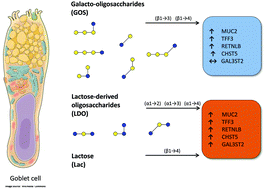The impact of oligosaccharide content, glycosidic linkages and lactose content of galacto-oligosaccharides (GOS) on the expression of mucus-related genes in goblet cells†
Abstract
Galacto-oligosaccharides (GOS) have been reported to modulate the function of intestinal goblet cells and to improve mucus barrier function. However, GOS is available in many structurally different compositions and it is unknown how GOS structural diversity impacts this modulation of goblet cells. This study aims to investigate the effects of oligosaccharide content and glycosidic linkages of GOS on expression of genes associated with the secretory function of goblet cells. To investigate the effect of oligosaccharide content, LS174T cells were incubated with (β1 → 4)GOS of variable transgalactosylated oligosaccharides and lactose (Lac) composition. To investigate the effect of glycosidic linkages, we compared the effects of (β1 → 4)GOS with (β1 → 3)GOS, and with a mixture of α-linked oligosaccharides (lactose-derived oligosaccharides-LDO). The changes in mRNA expression of mucus-related genes were assessed by RT-PCR. GOS containing Lac significantly enhanced the expression of MUC2, TFF3 and RETNLB but not of Golgi sulfotransferases genes. In contrast, GOS without Lac did not impact these genes. Lac alone significantly enhanced MUC2, TFF3, RETNLB, CHST5, and GAL3ST2 genes suggesting that Lac might be responsible for goblet cell modulation in (β1 → 4)GOS preparations. (β1 → 3)GOS induced the expression of MUC2 and TFF3, and downregulated the RETNLB gene. Compared with the (β1 → 3) and GOS (β1 → 4)GOS, the α-linked LDO significantly upregulated the expression MUC2, TFF3, RETNLB and the Golgi sulfotransferases genes. We identify structural features of GOS that contribute to enhanced mucus integrity. Our study might lead to better GOS formulations for foods to prevent or treat different types of intestinal disorders.



 Please wait while we load your content...
Please wait while we load your content...